You want to learn PHP but don’t know where to start.
With so many resources, tutorials, and courses available, it can be hard to know which is the best way for you to learn PHP.
In this post, we will go over how to learn PHP.
Best Way to Learn PHP
There are several strategies to learn PHP, and finding the best approach for you will rely on your learning style and objectives. For example, some learners enjoy watching tutorial videos, while others prefer reading books or taking an online course.
The most straightforward approach to learning PHP is finding a thorough reference that goes through all PHP basics, followed by coding small projects. Then, once you’ve learned the language well, you can start working on more significant tasks.
Also, suppose you want to learn PHP. In that case, you should become a member of the community and participate in online forums so that you may ask questions and receive feedback from experienced programmers. Then, you can quickly master PHP by taking advantage of all these tools.
Learning Resources for Beginner PHP Programmers
Interactive Courses
If you learn best by interacting with the material and practicing as you go, then paid or free online courses might be the right choice for you. Check out these options:
PHP for Beginners – Become a PHP Master – CMS Project on Udemy
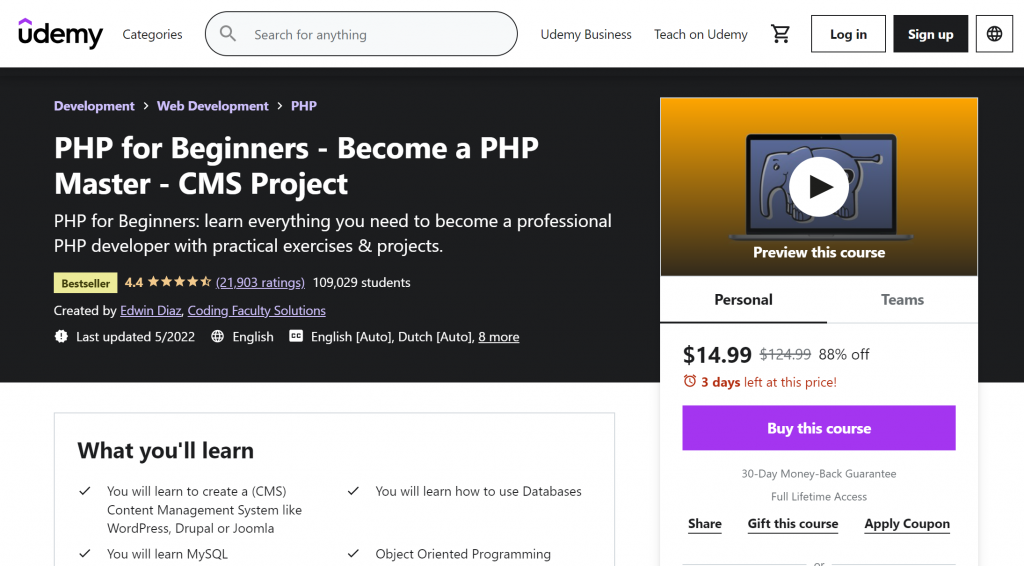
PHP for Beginners provides you with a whopping 37 hours of video instruction. This course is also one of the most popular PHP courses on Udemy, with over 100,000 students enrolled.
By the end of this course, you will be able to build dynamic websites and web applications using PHP.
Web Applications for Everybody on Coursera
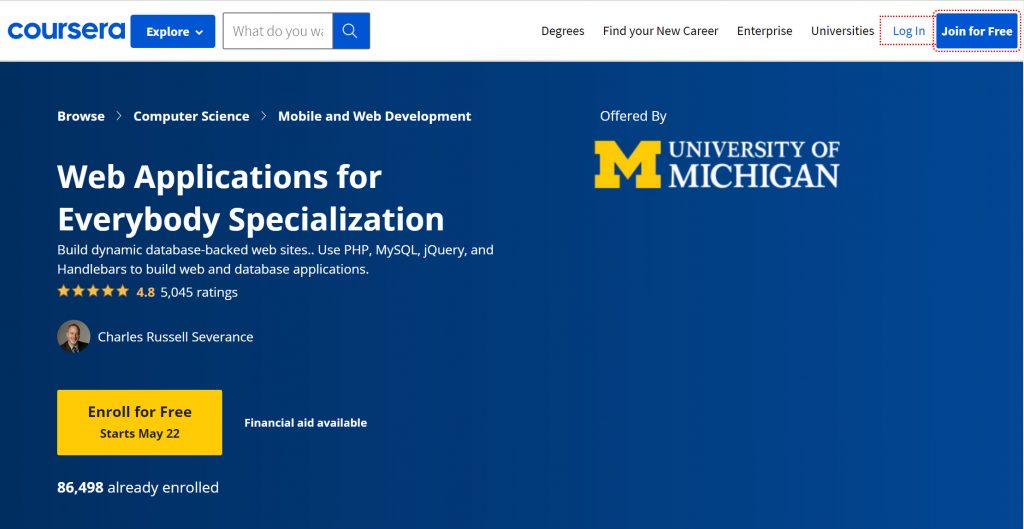
This Specialization will teach you how to create web applications for people who know some basics about responsive web design with JavaScript, HTML, and CSS. You’ll start by learning how to build internet apps in PHP with SQL databases. You’ll also learn how to use JavaScript, jQuery, and JSON.
You will build several web applications during this Specialization. These applications can help you get a job as a web developer. You don’t need any experience in programming or IT to start this Specialization, but you should have some basic skills.
As you build your programs and more complex online applications, you’ll learn essential skills like database design. You’ll also get a comprehensive introduction to web application development, from setting up a text editor to understanding how a web browser communicates with a web server to using JQuery events.
Learn PHP from Scratch on Educative
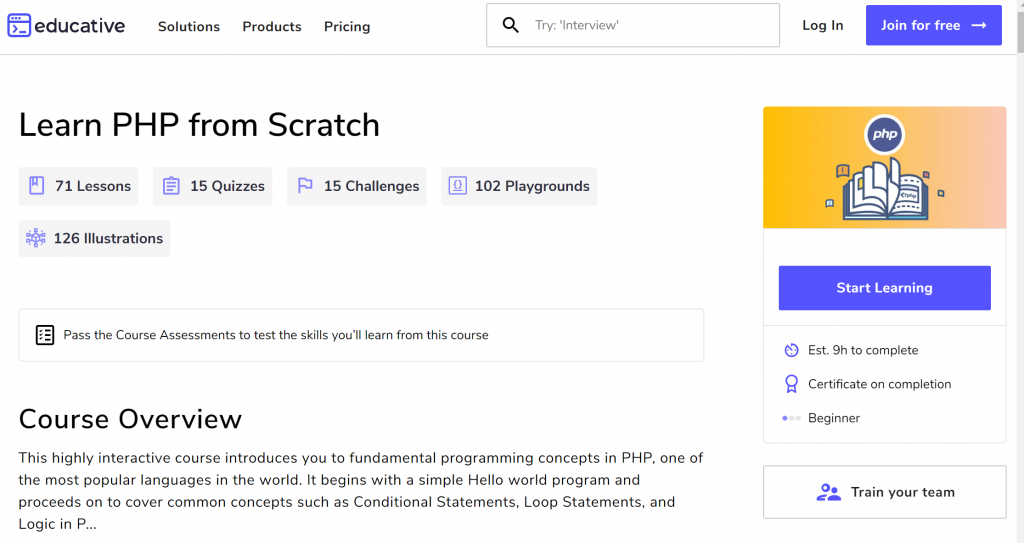
This PHP course will help you get started with the language. You will learn how to make a “Hello world” program and then move on to more complex programming concepts such as conditional statements, looping statements, and logic in PHP.
The course explains the concept of functions and arrays. Knowledge of these allows programmers to create better code.
This course will teach you more advanced PHP topics, such as classes, inheritance, and exception handling. You will have a good understanding of PHP basics by the time you finish this book.
PHP Fundamentals on Pluralsight
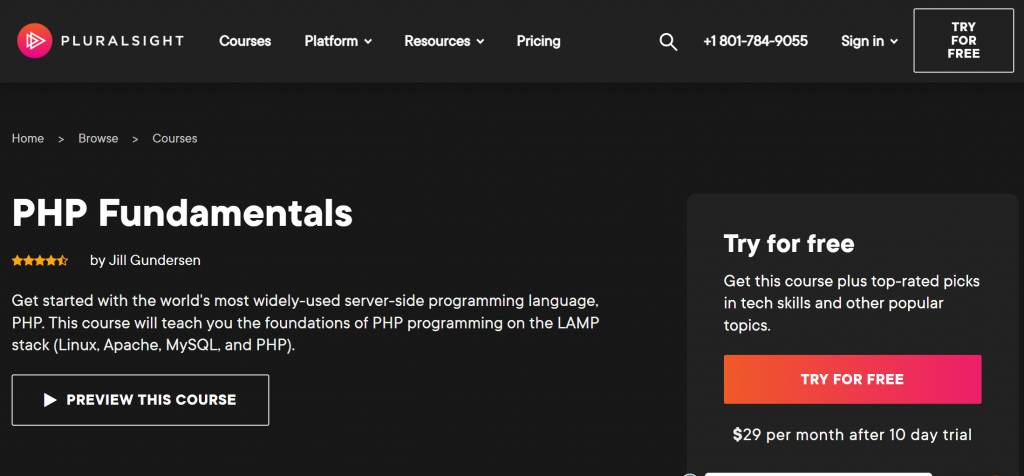
This PHP training course is for people who want to be successful PHP developers in a LAMP environment. You will learn about the PHP language and how to process forms, including using functions, arrays, classes, operators, and integrating with databases.
Books
If you’re a more traditional learner who prefers to read and work through examples independently, then these books might be right for you.
The Joy of PHP Programming: A Beginner’s Guide to Programming Interactive Web Applications with PHP and MySQL
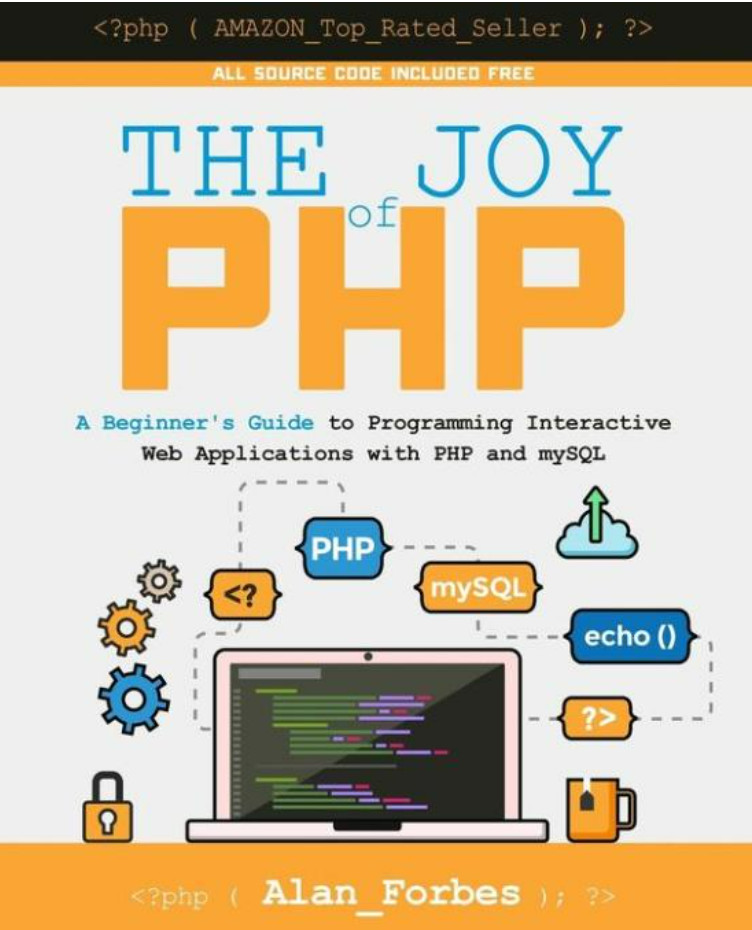
The author starts by teaching some basic HTML so that people can catch up quickly. Then, they teach how PHP works step-by-step. Next, you will learn to create and execute simple PHP scripts that modify web pages. After that, you will continue where you left off in subsequent lessons via a sequence of cohesive (and enjoyable) exercises.
You continue learning as you work on a website for a growing used car dealership. Continuing the work will help keep the material interesting and challenging. It will also help you learn how to apply what you are learning.
You will add new features and make changes to the car dealership website. This writing style will help you learn more and give you a sense of accomplishment. You can also apply what you learn to an actual situation and get a sample project to display to potential employers.
PHP & MySQL Novice to Ninja
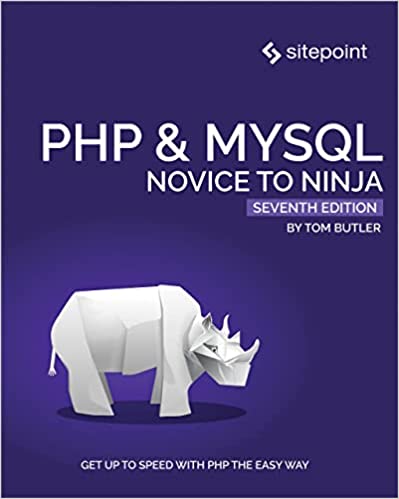
This book is called “7th Edition PHP & MySQL: Novice to Ninja.” It’s a guide on learning everything you need to create a professional web application using PHP & MySQL. The book covers the newest version of PHP (8) and modern best practices. It’s practical and entertaining, so you’ll never get lost and say engaged.
PHP: A Beginner’s Guide
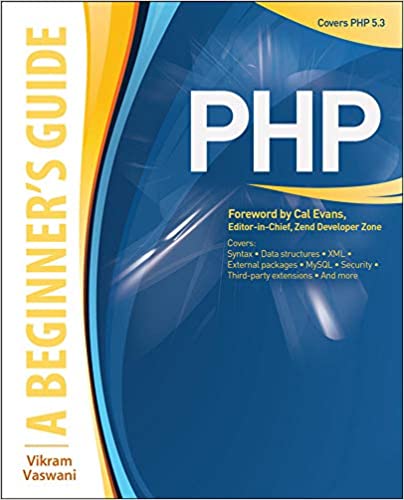
If you want to create websites full of data, you should learn how to use PHP. With the latest release of the book, you can learn how to write basic programs with PHP and more complicated features such as integrating databases into your website, XML input, and using extensions.
PHP and Algorithmic Thinking for the Complete Beginner
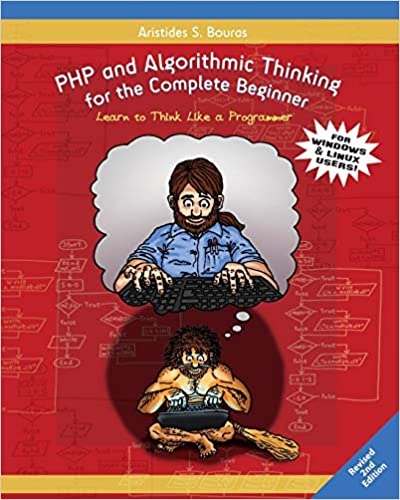
The book was revised to cover the latest version of PHP. As a result, the book is straightforward and clear, with no assumptions about the reader’s knowledge of computer programming.
The book is for people who want to learn how to program but don’t have any experience or knowledge. The book starts by teaching the first thing that all novice programmers should know: algorithmic thinking. Algorithmic thinking means learning how to solve problems using code.
This book has a class-style structure with questions and exercises at the end of each chapter. The quizzes will help you check your knowledge and understanding right away. In addition, there are about 150 multiple choice questions, 200 review questions, and 150 true/false questions included (with the solutions and answers available online).
Head First PHP & MySQL
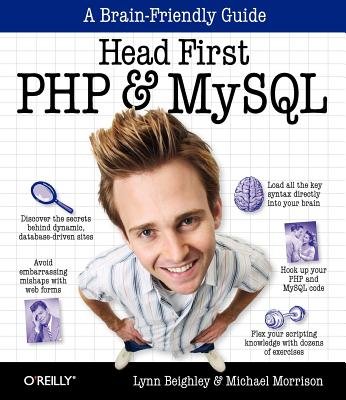
If you want to create web pages that are more complex than those possible with HTML and CSS, Head First PHP & MySQL is the right learning guide. This book will teach you to create dynamic, database-driven websites using PHP and MySQL. It covers all of the basics of server-side programming, from the basics of PHP and MySQL.
Tutorials
If you prefer to learn by working through some PHP tutorials, these might be right for you.
Official PHP Manual
The official guide to PHP. The Official PHP Manual is an excellent resource if you want to learn more about the language and how it works. The PHP documentation can at least get you started.
PHP: The Right Way
PHP The Right Way is a site that aims to promote good practices and dispel PHP myths. Not intended for beginners, but it will help you write excellent PHP code.
PHP Tutorial from W3Schools
W3Schools presents a great tutorial if you want to learn PHP basics. The tutorial covers all essential topics, from variables to control structures.
Video Tutorials
If you’re a visual learner or you want to be able to reference the material later, then video tutorials might be the right fit for you. These are some of our favorites:
PHP For Absolute Beginners
PHP For Absolute Beginners is an excellent series for people who want to learn PHP basic syntax. It covers all of the essential topics, from variables to control structures.
PHP Programming Language Tutorial – Full Course from freeCodeCamp.org
Free Code Camp offers training in all kinds of languages. For example, here is their version of PHP.
PHP for Beginners – 3 Hour Crash Course
If you want a quick intro to get right into building something on your own, this tutorial is for you.
Challenges and Projects for Beginners
Projects
Once you’ve learned the basics of the PHP programming language, you can start working on Python projects to practice what you’ve learned. These are some great starter projects to produce some Python code.
- Build a Calculator: This project will walk you through the process of building a simple calculator with Python.
- Design a Game: This project will show you how to design a simple game with the Python language.
- Create a Basic Web Page: This project will teach you how to create a basic web page using Python.
You can also check out my blog post on project ideas.
Challenges
If you’re searching for something to stretch your PHP abilities, here are some suggestions:
- Create a Quiz: This lesson will guide you through the process of creating a quiz with PHP.
- Build a Mad Libs Game: Show your PHP chops with a Mad Libs game.
- Create a Tic Tac Toe Game: Create a Tic Tac Toe game in PHP.
Of course, these are only a few suggestions to get you started. You will have a more excellent grasp of how to use PHP after completing a few tasks, and you will be able to tackle more complex assignments. Furthermore, as you continue to learn and develop as a coder, PHP will become clear that it is a powerful and flexible language capable of building unique and scalable websites.
Wrapping Up
Now that you know where to find resources and how to start learning PHP, it’s time for you to start coding! In this article, we’ve provided various resources for beginner PHP programmers. We’ve also included a few challenges and projects to help you practice your skills. As you continue to learn and grow as a programmer, you will find that PHP is a beneficial and versatile language that you can use to create some fantastic websites.
FAQ
What is the PHP Programming Language?
PHP is a versatile scripting language widely used for web development. PHP code can embed it into HTML code or be used to develop server-side programs. PHP code is interpreted by a web server, producing the resulting HTML code. PHP is free to download and use, and it runs on all major operating systems. You write PHP code in a text editor, and there are many different code libraries available. In addition, developers can integrate PHP with many other frameworks, including Laravel and Symfony. As a result, PHP is a powerful tool for creating dynamic web applications.
Why Learn PHP?
Most people have heard of HTML, the code that helps create the structure of a website. PHP is another coding language, but it is used for more than just creating websites. Developers can use it to develop software and applications, games, and much more. Even though built in the mid-1990s, coders still frequently use it today. Its popularity is that it is free to use and open-source, meaning anyone can contribute to its development. Another reason is that it is relatively easy to learn, even for those with no coding experience. As a result, PHP remains one of the most popular programming languages today.
Is It Worth Learning PHP in 2022?
PHP is a server-side programming language that has been around for over two decades. In that time, it has become one of the most popular languages for creating dynamic web pages. So if you’re considering learning PHP, you might be wondering if it’s still a relevant language in 2022.
The short answer is yes, PHP is still a valuable language to learn. While newer languages such as Java and Python have surpassed PHP in popularity, PHP remains a popular choice for web development. In fact, according to the 2018 Stack Overflow Developer Survey, PHP is the fourth most popular programming language overall.
So why is PHP still so popular? First, it powers some of the world’s most popular websites, including Facebook, Wikipedia, and WordPress. Another reason is that it’s relatively easy to learn, especially compared to other languages. So even if you’re starting with programming, you can quickly pick up the basics of PHP.
So if you’re considering learning a new programming language in 2022, PHP is worth considering. Whether you want to create dynamic web pages or build popular websites, PHP can help you reach your goals.
How Long Does it Take to Learn PHP Compared to Other Programming Languages?
PHP is a popular programming language used to develop websites and web-based applications. Many beginners wonder how long it will take to learn PHP compared to other languages. The answer is that it depends on your level of experience and learning style. If you are a complete beginner, it will probably take longer to learn PHP than if you already have some experience with programming. However, PHP is generally considered an easy language to learn, so even beginners should be able to pick it up relatively quickly. In addition, there are many resources available to help you know PHP, including online tutorials and books. As a result, with a little effort, you should be able to learn PHP in a relatively short amount of time.
What is the Easiest Way to Learn PHP?
While there is no easy answer when it comes to learning PHP, a few things can make the process simpler. First, one of the best ways to learn PHP is to work on a project that uses the language. Building a project will not only force you to use PHP in a real-world setting, but it will also give you a chance to see how experienced developers use the language. In addition, there are several resources available online that can help you learn PHP. These include tutorials, books, and online courses. While each person learns in different ways, taking advantage of these resources can help you develop a strong understanding of PHP.
Is PHP Easier to Learn Than Python?
When it comes to web development, there are a lot of different programming languages to choose from out there. Two of the most popular options are PHP and Python. But which one is easier to learn? That’s a tricky question to answer, as it depends on many factors. However, PHP may be slightly easier to understand than Python.
Firstly, PHP is a scripting language, while Python is a general-purpose programming language. PHP is designed specifically for web development, so it has all the features you need to build a website and not a whole lot else.
On the other hand, you can use Python for web development, data science, and machine learning. However, with this versatility comes a price that Python has a more steep learning curve.
Secondly, PHP may be easier to learn because it has a simpler syntax than Python. PHP syntax is the format of the language. A simpler syntax means fewer rules to memorize when writing code in PHP. Fewer rules and things to get wrong can make PHP code less confusing and easier to read.
However, keep in mind that both PHP and Python are relatively easy to learn compared to other programming languages. So whichever one you choose, you should be able to pick it up relatively quickly.
Shouldn’t I learn a ‘true’ Object Oriented Programming Language Instead of PHP?
PHP is criticized for not being a “true” object-oriented language. However, this doesn’t mean that developers can’t use it to write robust, object-oriented code. On the contrary, PHP has many features that suit object-oriented programming, including classes, inheritance, and interfaces. Furthermore, many well-established frameworks use PHP as their foundation, such as Laravel and Symfony. So if you’re wondering whether or not you should learn PHP, the answer is yes – it’s a perfectly viable option for object-oriented programming.
